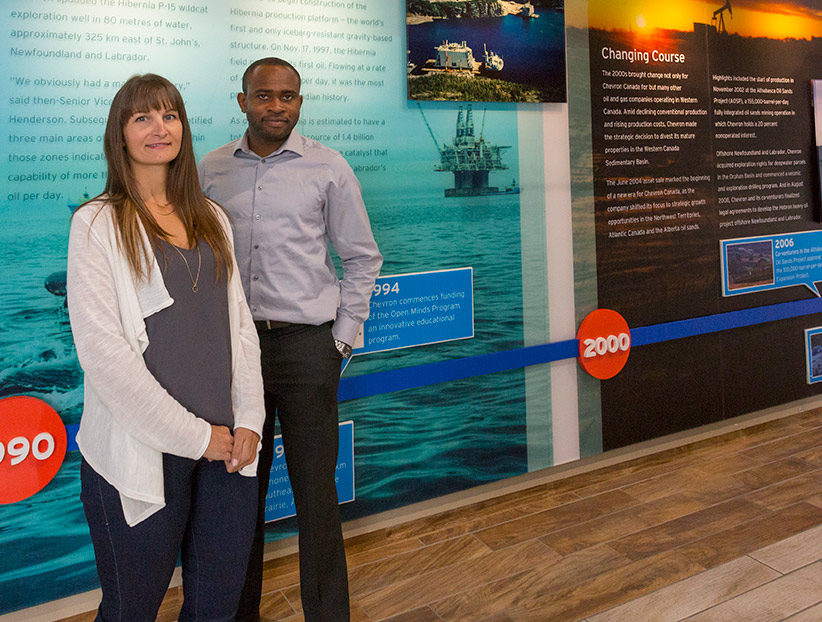feature chevron professionals encourage students to pursue careers in science, technology, engineering and math
Chevron Canada employees Brendan MacDougall, Osita Aniekwe and Emily Jobson have uniquely different backgrounds, careers and interests. But they all share one thing in common: A strong belief in the value of STEM education.
All three have built rewarding careers through their individual pursuit of high school and post-secondary education and training focused on science, technology, engineering and math (STEM).
And now as energy industry professionals, they are encouraging Canadian youth to follow in their footsteps through their participation in various Chevron-sponsored STEM initiatives such as Let's Talk Science, CurioCity and the TELUS Spark Prototype Project.

Chevron Canada professionals Emily Jobson and Osita Aniekwe say the sky’s the limit in career possibilities for students with a post-secondary education in science, technology, engineering and math.
brendan macdougall
Brendan MacDougall, a chemical engineer, comes from a family of educators, so it's only natural that he’s doing his part to encourage students to set high goals for themselves in high school and beyond.
As a first-year engineering student at the University of Calgary, MacDougall was asked to speak to a class of Grade 12 students about engineering as a potential education and career path.
Fast forward to today and MacDougall, a completions engineer for Chevron Canada, continues to motivate students through his involvement in the Let’s Talk Science Challenge and CurioCity.
"I think STEM is a great life choice. It has really worked out for me and it's really worked out for a lot of people I know," he says. "I think for me, ultimately, what I am trying to tell them is the world needs more students in STEM. We need to inspire younger generations to follow in our footsteps."
Indeed, MacDougall has no regrets about the career path he chose. "Engineering is a great degree because you have such a variety of choices. It offers a lot of flexibility to adapt."
osita aniekwe
Osita Aniekwe, a reservoir engineer with Chevron Canada, volunteers with the TELUS Prototype Project.
Over the past two years, he has mentored some 300 Grade 8 students at two junior high schools in the Calgary area in the development of their science fair projects, which range from designing next-generation space suits to creating tsunami warning and detection systems to finding more efficient ways to grow crops.
A native of Nigeria who holds an undergraduate degree in electrical engineering and a master’s degree in petroleum engineering from the University of Calgary, Aniekwe says students gain invaluable experience in learning how to develop their ideas into a demonstration project and in overcoming challenges.
"Our job is to guide them through the thinking process and to help them solve the problems, not solve the problems for them."
Most importantly, he says, the science projects enable the students to connect the dots from subjects they study in school to the real world. "It takes it out of the classroom and makes it real for them. That's why I am investing my time – it's all about helping these young kids to stay in STEM."
And Aniekwe is quick to point out that he also benefits from his volunteer work, improving both his problem solving and communication skills. "It's a win-win for me and for the kids."
emily jobson
Emily Jobson, an environmental specialist with Chevron Canada, is proof that there is more than one path to a STEM career. Jobson completed high school with no clear idea of what she wanted to do.
But when an oil spill happened near her home town in northern B.C., she wound up working for the pipeline company responsible for the spill. "I just happened to be exposed to health, environment and safety work, and then I realized I loved it and began to focus my education on it."
Jobson went on to earn a diploma in environmental management, followed by a masters of arts in environment and management from Royal Roads University.
"Even though I don't have a pure STEM degree, I work on STEM-related topics like hydrology, climate change, and geology, and often take short courses in STEM topics so I can understand what I'm working on," she explains.
"Part of it is learning as I go. A lot of time I rely on people with STEM degrees to provide me with the overview that I need to make decisions."
Jobson encourages high school students entering university to take first-year STEM courses, even if it isn’t their focus, as they may discover a new area of interest. "STEM degrees are a good foundation for a variety of career paths."